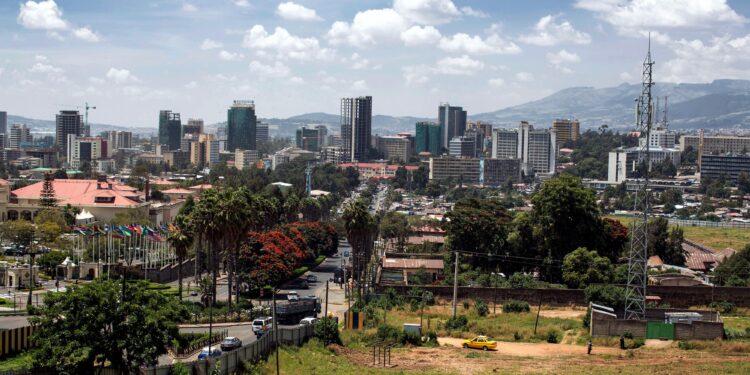Ethiopia has officially completed the construction of its controversial Grand Ethiopian Renaissance Dam (GERD) on the Blue Nile River, a landmark achievement that marks a significant milestone in the nation’s efforts to address its energy needs. The dam, which has been a focal point of tension between Ethiopia, Egypt, and Sudan over water rights and management, is set to generate over 6,000 megawatts of electricity, promising to transform Ethiopia’s economy and provide power to millions. As Ethiopia celebrates this achievement, the completion of the dam reignites longstanding disputes with Egypt, which relies heavily on the Nile for its freshwater supply. This development is not only shaping the future of Ethiopia’s energy landscape but also complicating regional relations in the eastern Nile basin.
Ethiopia’s Completion of Nile Dam Marks a New Era in Regional Power Dynamics
The completion of Ethiopia’s Grand Ethiopian Renaissance Dam (GERD) on the Nile River has undeniably shifted the geopolitical landscape in the region, signaling a pivotal moment in the long-standing disputes over water resources among East African nations. As the largest hydroelectric project in Africa, the dam is expected to generate over 6,000 megawatts of electricity, providing Ethiopia with a vital tool for economic growth and energy independence. This monumental achievement is not only a testament to Ethiopia’s engineering capabilities but also bolsters its position in the region, enabling the country to assert greater influence in negotiations surrounding the Nile waters, which have historically been dominated by downstream nations, particularly Egypt and Sudan.
Despite Ethiopia’s claims of economic necessity and sustainable development, this completion raises critical concerns among its downstream neighbors. Egypt, heavily reliant on the Nile for its freshwater supply, has expressed fear that the dam could significantly reduce water flow, posing a threat to its vast agricultural sector and overall water security. The complexities of these dynamics can be further illustrated in the following table, which outlines the competing interests and positions of the three key nations involved in the Nile dispute:
| Country | Interests | Concerns |
|---|---|---|
| Ethiopia |
|
|
| Egypt |
|
|
| Sudan |
|
|
Understanding the Environmental and Economic Impacts of the Grand Ethiopian Renaissance Dam
The Grand Ethiopian Renaissance Dam (GERD) represents a monumental achievement for Ethiopia, poised to transform the country’s energy landscape and propel economic growth. With an estimated generation capacity of over 6,000 megawatts, the dam is set to provide electricity to millions, potentially exacerbating Ethiopia’s industrial capabilities. The economic benefits include:
- Reduction in electricity shortages: By securing a reliable power supply, the dam will address longstanding energy deficits affecting industries and households.
- Job creation: The construction and operation phases are expected to generate thousands of job opportunities, stimulating local economies.
- Reduced energy costs: Increased electricity availability could lead to lower energy prices, benefiting consumers and businesses alike.
However, the GERD’s impact extends beyond economic factors, raising significant environmental concerns, particularly regarding water management in the Nile Basin. As Ethiopia moves forward with filling the dam’s reservoir, the flow of the Nile—crucial for downstream countries like Egypt and Sudan—may be compromised. Key environmental considerations include:
- Altered river ecosystems: Changing water levels could disrupt local aquatic life and biodiversity in the Nile, affecting agriculture and fishing industries.
- Soil degradation: Reduced sediment flow, essential for maintaining fertile soils, could lead to long-term agricultural challenges downstream.
- Climate resilience: The management of water resources will be crucial as climate change exacerbates weather variability in the region.
Table: Potential Economic Benefits vs. Environmental Risks
| Benefits | Risks |
|---|---|
| Increased energy generation | Impact on Nile’s water flow |
| Create job opportunities | Disruption of aquatic ecosystems |
| Lower energy costs | Soil fertility loss |
Paths to Diplomatic Resolution: Recommendations for Egypt, Sudan, and Ethiopia
The completion of Ethiopia’s power-generating dam on the Nile necessitates a careful reevaluation of diplomatic relations among Egypt, Sudan, and Ethiopia. All three nations should prioritize dialogue over discord by engaging in comprehensive negotiations that address mutual concerns. To foster a constructive environment, the following measures are recommended:
- Establish a trilateral committee: A dedicated body comprising representatives from each country could facilitate ongoing discussions and monitor agreements.
- Implement regular water-sharing dialogues: Routine meetings should be scheduled to reassess water management strategies, ensuring that all parties’ needs are met.
- Encourage regional mediation: Involving neutral third-party states or international organizations could provide valuable perspectives and help mediate contentious issues.
- Initiate confidence-building measures: Joint development projects or water conservation initiatives can serve to build trust and demonstrate a commitment to collaboration.
Additionally, transparency should be at the forefront of each nation’s initiatives regarding the Nile’s resources. A possible framework might include:
| Action Item | Responsibility | Timeline |
|---|---|---|
| Conduct a joint hydrology study | All three nations | Within 6 months |
| Draft a preliminary agreement | Trilateral committee | Within 1 year |
| Monitor implementation | International observers | Ongoing |
These cooperative steps aim to foster a climate of trust and accountability, ultimately ensuring that the shared resource of the Nile is equitably managed and preserved for future generations.
To Wrap It Up
In conclusion, the completion of Ethiopia’s Grand Ethiopian Renaissance Dam marks a significant milestone in the nation’s ambitions to achieve energy independence and foster economic growth. However, this development also underscores the complexities of regional dynamics, particularly in relation to Egypt’s longstanding concerns over water security and resource management in the Nile basin. As negotiations continue amidst growing tensions, the international community’s role will be crucial in facilitating dialogue and finding solutions that respect the rights and needs of all nations dependent on this vital water source. The future of the Nile River and its ecosystems, as well as the livelihoods of millions, depends on a collaborative approach to managing its resources peacefully and sustainably.














